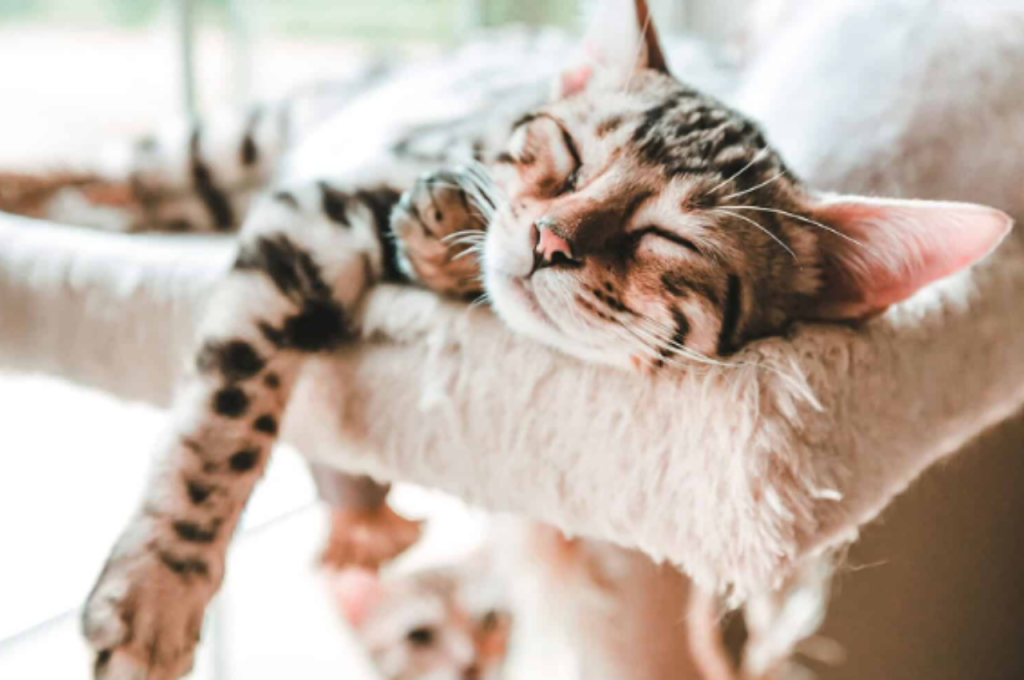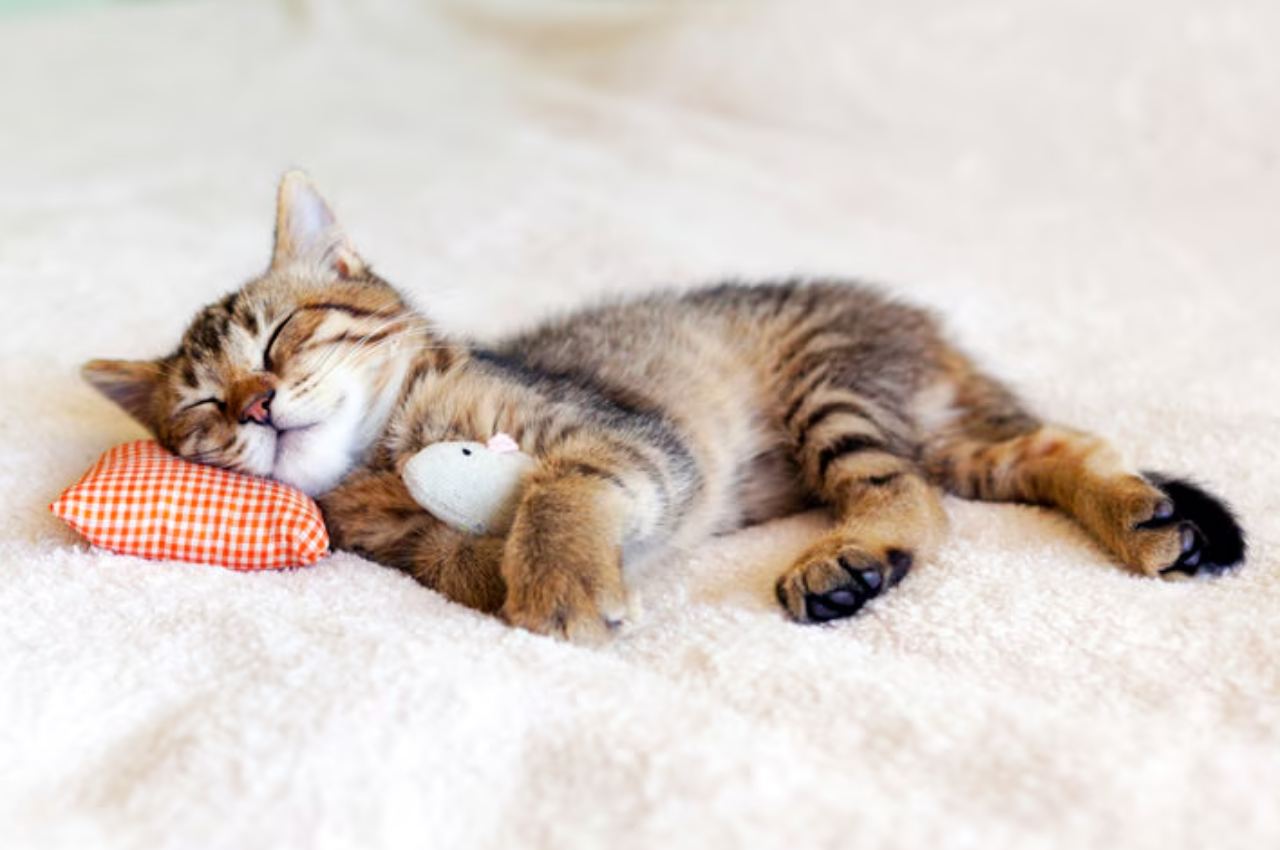To train a kitten to sleep at night, establish a bedtime routine with playtime and feeding before bed. Create a cozy sleeping space for your kitten with a comfortable bed and familiar blankets
Additionally, provide a warm environment and soothing background noise to help your kitten feel secure and relaxed. Positive reinforcement and consistency in your routine will help your kitten learn to sleep through the night peacefully.
Remember to be patient and understanding during the training process as kittens may take time to adjust to new sleep patterns. With love and patience, you can successfully train your kitten to sleep soundly at night.
Understanding Your Kitten’s Sleep Patterns
Understanding your kitten’s sleep patterns is essential when training them to sleep at night. Kittens, like all young animals, need plenty of rest for their growth and development. However, their sleep cycles can seem erratic, making it challenging for new pet owners to establish a consistent nighttime routine.

Kittens typically sleep 16 to 20 hours a day, but their sleep is divided into several short naps rather than one long stretch. This polyphasic sleep pattern is a holdover from their wild ancestors, who needed to stay alert to avoid predators. Consequently, your kitten may be wide awake and ready to play just when you’re winding down for the night.
To train your kitten to sleep at night, create a conducive sleep environment. Provide a comfortable, quiet sleeping area away from household noise and distractions. Ensure it’s warm and cozy, making your kitten feel secure enough to rest.
Regulate their activity levels throughout the day by engaging in active play sessions during the day and early evening. Avoid intense play before bedtime to prevent overstimulation.
Establish a consistent bedtime routine, such as gentle petting or creating a quiet environment, to signal that it’s time to sleep.
By understanding and working with your kitten’s natural behaviors, you can train them to adapt to a nighttime schedule, ensuring both you and your furry friend get a good night’s rest.
Creating a Calm Sleeping Environment
Train your kitten to sleep peacefully at night by creating a calming sleeping environment. Provide a cozy bed, keep a consistent routine, use soft lighting, play calming music, and avoid excessive noise to ensure a restful night for your furry friend.
Creating a Calm Sleeping Environment Designate a Cozy Sleeping Area To start, designate a cozy sleeping area for your kitten to feel safe and secure. Ensure this space is comfortable with a soft blanket or cat bed. This designated area will become your kitten’s go-to spot for rest and relaxation. Ensure Darkness and Reduced Noise Next, ensure darkness and reduced noise in the sleeping area.
Use curtains to block out any excess light and minimize disruptive sounds. These adjustments will create an optimal sleeping environment for your kitten. Overall, these strategies will help your kitten rest peacefully through the night.
Establishing a Consistent Bedtime Routine
Establishing a consistent bedtime routine is crucial in training a kitten to sleep at night. Kittens, like human babies, thrive on routine and predictability, so creating a set schedule for bedtime can help them feel more secure and comfortable, leading to better sleep patterns and less disruption during the night.
Set a Regular Bedtime
Consistency is key when setting a regular bedtime for your kitten. Choose a time that works for your schedule and stick to it every night. Kittens respond well to routine, so establishing a consistent bedtime will signal to them that it’s time to wind down and prepare for sleep.
Engage In Winding-down Activities
Before bedtime, engage in calming activities that signal to your kitten that it’s time to relax. This can include gentle playtime, grooming, or cuddling. By engaging in these activities each night, your kitten will learn to associate them with the impending bedtime.
Promoting Healthy Playtime and Exercise
When it comes to training a kitten to sleep at night, promoting healthy playtime and exercise is crucial. Creating a balanced routine that includes engaging activities during the day and calming rituals before bedtime can help kittens adjust to a regular sleep schedule. In this section, we’ll cover some effective strategies to encourage active play during the day and ways to avoid overstimulation before bedtime.
Encourage Active Play During The Day
Kittens are naturally energetic creatures, and engaging them in regular play sessions throughout the day can help expel excess energy and promote better sleep at night. To encourage active play, consider incorporating interactive toys, such as feather wands or laser pointers, into your kitten’s daily routine. These toys not only provide physical exercise but also stimulate their natural hunting instincts, keeping them mentally engaged.
- Utilize interactive toys, such as feather wands or laser pointers
- Rotate toys regularly to keep the playtime sessions stimulating
- Designate specific playtimes to establish a consistent routine for your kitten
Avoid Overstimulation Before Bedtime
As bedtime approaches, it’s important to create a calm and serene environment to help your kitten wind down. Avoid overstimulating activities, such as loud noises or rough play, before bedtime. Instead, opt for gentle interactions and quieter play options, such as puzzle toys or soft balls. By transitioning to tranquil activities before bedtime, you can help your kitten relax and prepare for a restful night’s sleep.
- Introduce calming activities, such as puzzle toys or soft balls
- Avoid loud noises or rough play during the evening hours
- Create a serene environment to help your kitten wind down before bedtime
Feeding Schedule and Impact on Sleep
Establishing a regular feeding routine is essential in training a kitten to sleep at night. Kittens, like babies, thrive on routine and predictability, making it easier for them to settle down at bedtime. By creating a consistent feeding schedule, you can help regulate your kitten’s sleep patterns and promote a peaceful night’s rest for both you and your furry friend.

Establish A Regular Feeding Routine
When it comes to training a kitten to sleep at night, establishing a regular feeding routine is crucial. Kittens thrive on consistency, and by feeding them at the same times each day, you can help regulate their energy levels and create a sense of predictability. This routine will also help your kitten develop a natural rhythm, making it easier for them to settle down for the night.
Avoid Feeding Close to Bedtime
Avoid feeding your kitten close to bedtime. By ensuring that their last meal or snack is given at least a couple of hours before bedtime, you can minimize the likelihood of your kitten being restless and active when it’s time to sleep. This allows your kitten to digest their food without feeling energetic, leading to a peaceful and uninterrupted night’s sleep for both you and your furry companion.
Addressing Common Sleep Disruptions
Train your kitten to sleep peacefully through the night with these effective strategies and tips. Create a comfortable sleeping environment, establish a bedtime routine, and provide mental and physical stimulation throughout the day to address common sleep disruptions.
Dealing with Nighttime Crying or Meowing
When it comes to nighttime crying or meowing, it’s important to understand that kittens are naturally active and curious creatures. However, it’s essential to establish a routine that helps them learn when it’s time to sleep and when it’s time to play.
To address this common disruption, follow these steps:
- Ensure your kitten receives enough play and exercise during the day, especially in the evening.
- Provide a comfortable and quiet sleeping area for your kitten, away from distractions.
- Before bedtime, engage in a calm and relaxing play session with your kitten to tire them out.
- Make sure your kitten has access to litter facilities, food, and water before bed to prevent interruptions.
- If your kitten starts crying during the night, avoid responding immediately to every meow, as this may reinforce the behavior. Instead, wait for a brief period of quiet before checking on them.
- If your kitten continues to cry or meow, offer reassurance by speaking softly, but avoid picking them up or giving in to their demands. This will teach them that nighttime is for rest, not playtime.
Preventing Accidental Wake-ups
Accidental wake-ups can disrupt your kitten’s sleep schedule, leading to a restless night for both of you. Here are some tips to prevent these unwanted disturbances:
- Ensure your kitten’s sleeping area is away from high-traffic areas and noisy environments.
- Use blackout curtains or shades to block out any external sources of light that might trigger your kitten’s wakefulness.
- Avoid sudden loud noises in your home during your kitten’s sleep time.
- Establish a consistent bedtime routine, with feeding, playtime, and grooming done at the same time each night.
- Consider using a white noise machine or calming music to drown out any unexpected noises that may wake your kitten.
- Resist the temptation to check on your kitten throughout the night unless absolutely necessary. This will help them learn to self-soothe and go back to sleep on their own.
Avoiding Reinforcement of Undesirable Behaviors
To train a kitten to sleep at night, establish a consistent bedtime routine that includes playtime and a balanced meal. Avoid reinforcing undesirable behaviors by ignoring attention-seeking actions and providing a comfortable sleeping area away from your bedroom. Gradually, the kitten will learn to settle down and sleep through the night.
Discouraging Attention-seeking Behaviors
To train a kitten to sleep at night, it is essential to discourage attention-seeking behaviors. Kittens are naturally curious and playful, but during nighttime, it’s important for them to understand that sleep is expected. Here are some strategies you can employ to discourage attention-seeking behaviors:
- Ignore your kitten’s attempts to grab your attention during the night.
- Refuse to engage in any playtime or petting when it’s time for sleep.
- Avoid responding to meowing or scratching at your bedroom door.
- Redirect your kitten’s energy towards interactive toys or puzzle feeders.
- Keep a consistent nighttime routine to establish expectations.
Consistency In Response
When training a kitten to sleep at night, consistency is key. It is essential to respond the same way every time your kitten exhibits undesired behaviors. Consistent responses help the kitten understand what is expected of it and what behaviors are not rewarded. Here’s how you can maintain consistency:
- Clearly communicate your expectations to your family or household members.
- Synchronizing your responses to any attention-seeking behavior exhibited by the kitten.
- Partake in consistent play and feeding schedules that support a structured routine.
- Ensure everyone in the household is aware of the plan and follows it diligently.
- Use the same verbal commands or signals to reinforce desired behaviors and discourage undesired behaviors.
Remember, training a kitten takes time and patience. Consistency and discouraging attention-seeking behaviors are essential components of establishing a healthy sleep routine for your kitten. With time and perseverance, you’ll be able to successfully train your kitten to sleep at night.
Maintaining Patience and Persistence
Training a kitten to sleep at night requires maintaining patience and persistence. Being patient and consistent is key to success.

Being Patient During The Training Process
Patience is crucial when helping a kitten adjust to a new sleep routine. Avoid reacting impulsively to nighttime disturbances. Use gentle redirection and positive reinforcement techniques for behavior correction.
Remaining Consistent Over Time
Consistency is essential for establishing healthy sleep habits. Stick to the same bedtime routine each night. Ensure the sleeping environment is comfortable and inviting for the kitten.
Conclusion
Help your kitten sleep peacefully with these simple tips. Consistent routine and cozy bed are key. Avoid playtime before bed to encourage restful sleep. Creating a calm environment benefits both you and your furry friend. Remember, patience and love will lead to a well-rested, happy kitten.
